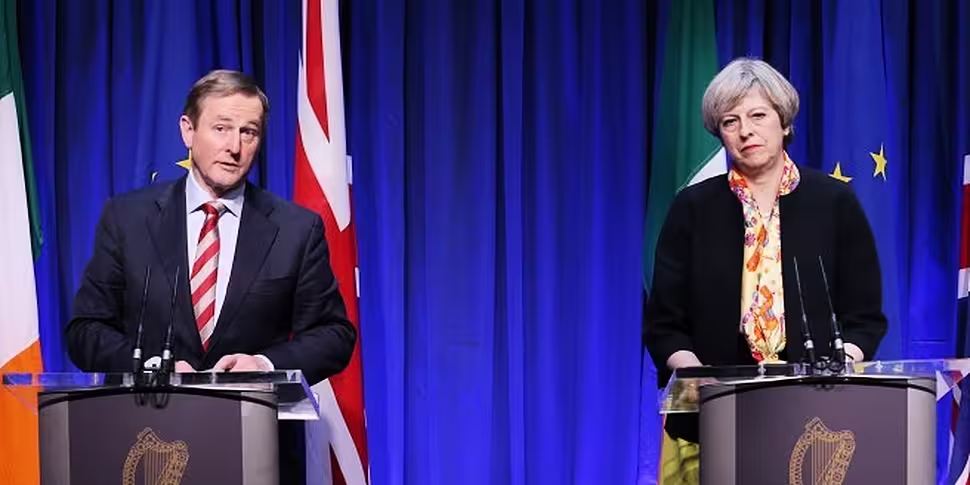British PM Teresa May is set to trigger Article 50 next week, entering a two-year window for the UK to negotiate its exit terms - but there are provisions for this time-frame to be extended.
Vincent Power, a specialist in EU law with A&L Goodbody believes it will take a lot longer than two years for the UK to leave the Union.
"When people look at Article 50 very carefully - there is actually the possibility of an extension (to the two year period) - the European Council can decide that it will be longer than two years," he said, adding that commentary expecting talks to be constricted to a strict 24 month period has been misguided.
He joined Vincent Wall on Breakfast Business this morning and highlighted a combination of legal challenges, elections, an EU tradition of protracted negotiating processes, and even a possible referendum in Ireland as factors which can delay Brexit.

"You could have a situation where something which could be an agreement for 500 million people could actually be decided by 3 million or 4 million voters in Ireland," he told Newstalk, citing provisions in the Irish legal system which could lead to a referendum before the the UK's exit deal can be ratified.
"If you think that that will not happen - think about what has happened in the past," he added - citing the recent stalling of a major EU/Canada trade deal due to objections from one region in Belgium.
An Irish Vote
The possibility of an Irish referendum on a Brexit deal is a grey area - because we don't know what the exit deal will look like.
As with (almost) everything Brexit-related this is a complicated question but there are a number of avenues which could lead to an Irish vote on the ratification of the UK's deal.
If new institutions are created, such as one managing the relationship between the UK and the EU or a specific body for Ireland and Britain, that could trigger an Irish vote.
This will be a defining moment for our country, as we begin to forge a new relationship with Europe & a new role for ourselves in the world. pic.twitter.com/zM69aZlhpa
— Theresa May (@theresa_may) March 14, 2017
People and political groups can also campaign for referendums on issues of national importance (like the current push for a referendum to create new protections for the public ownership of Ireland's water infrastructure in the constitution) and the ratification of a Brexit deal could fall into that category.
Former IBEC director Peter Brennan recently published a paper on the question of whether in the immensely complicated process of Britain leaving the EU will result in a referendum in Ireland.
He believes that, "Taking account of previous decisions of the Supreme Court in Ireland, a working assumption must be made that whatever legal agreements result from Brexit negotiations will have to be put to a referendum in Ireland."
Mr Brennan highlights the fact that The Good Friday agreement is anchored by the relationships between the UK, Ireland, and the EU.
He argues that this means, "The 'Exit Treaty' may therefore require the Good Friday Agreement to be amended and in such an event changes will have to be ratified by a referendum on both sides to the border."

Flux
Beyond Ireland, Mr Power told Newstalk that the Brexit process is likely to be complicated by both the large number of parties involved, and a series of elections across the EU during these negotiations.
"That means you have a changing cast, you have a changing list of priorities, you have a changing list of issues," he said.
The process could also clash with the scheduled EU Parliamentary election in 2019 and a British General Election in 2020 which will be dominated by Brexit if these talks are still on-going.
The Long Game
In December of last year, Jean-Claude Piris, who was the head of the EU Council’s legal service between the late 80's and 2010, also said that the complicated nature of a post-Brexit trade deal for the UK means that it will be impossible to finalise an agreement by 2019.

Mr Piris, who is one of the architects of the Maastricht and Lisbon treaties, told The Financial Times that, "thousands of pages and hundreds of articles" need to be written as an agreement is drawn up and this could take up to 10 years.
He added that this is, "not the most pessimistic view because the most pessimistic view is that there will be no agreement at all."
"It will take years, that’s for sure. I don’t know how many years [...] Some people say between four and eight years but that is if people have goodwill on both sides," and there is no guarantee that there will be good will on all sides when talks finally get underway.









